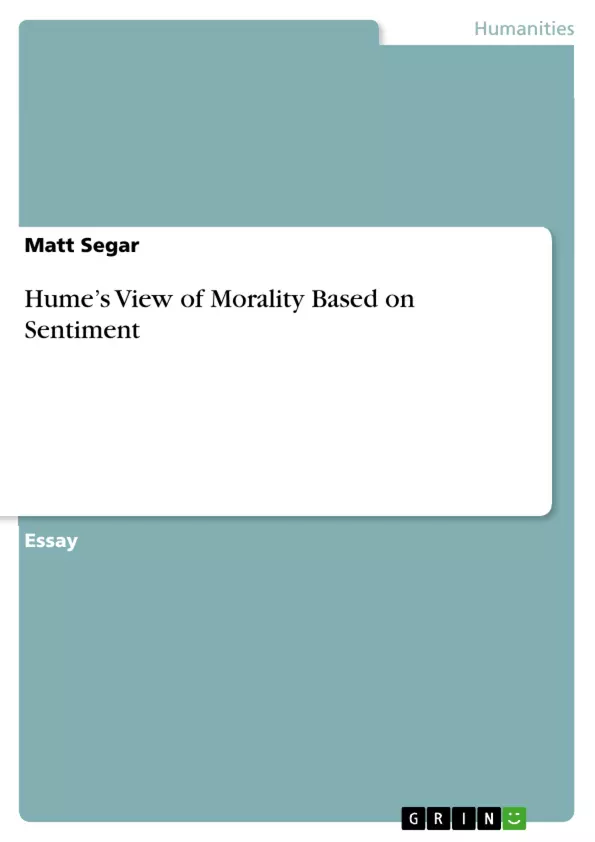For thousands of years, a major issue of moral philosophy has been whether morality is based on reason or sentiment. In ancient Greece, some viewed morality as being a matter of feelings while others believed that goodness was a matter of intelligence. Hume discusses each view in his Enquiry Concerning the Principles of Morals. However, Hume comes to the conclusion that, “morality is determined by sentiment”.
Inhaltsverzeichnis (Table of Contents)
- Hume's View of Morality Based on Sentiment
- Amiability: The Sentimental Response
- Reason's Limitations: Relations and Matters of Fact
- Distinguishing Mistakes in Principles and Matters of Fact
- Moral and Natural Beauty: A Comparison
- Relationships Between Moral Agents and Inanimate Objects
- Motivation: The Drive to Act
- Objections and Responses
- The Problem of Changing Morals
- Moral Disputes: A Challenge to Sentimental Morality
- Subjectivity and Universality
- Fourli: A Case Study in Moral Variation
- Conclusion: Morality as Sentiment
Zielsetzung und Themenschwerpunkte (Objectives and Key Themes)
This text examines David Hume's argument that morality is ultimately based on sentiment rather than reason. Hume's view is presented and explored, along with objections and responses. The text aims to provide a comprehensive understanding of Hume's theory and its implications.
- Hume's Argument for Sentiment-Based Morality
- The Role of Reason in Morality
- The Nature of Sentiments in Moral Judgments
- Objections to Hume's View
- The Impact of Cultural Variation on Morality
Zusammenfassung der Kapitel (Chapter Summaries)
The text begins by outlining Hume's central claim that morality is determined by sentiment, not reason. Hume argues that reason alone cannot produce moral judgments because it can only deal with relations and matters of fact, not the emotional responses that are essential to morality. He further asserts that reason cannot motivate action without sentiment.
The text then delves into Hume's four main arguments supporting the notion of amiability – that virtue is inherently amiable and vice odious. These arguments explore reason's limitations in determining moral approval or disapproval, the distinction between mistakes in principles and matters of fact, the similarities between moral and natural beauty, and the relationship between moral agents and inanimate objects.
Next, the text examines Hume's argument that moral distinctions motivate action. He asserts that the ultimate ends of human action cannot be accounted for by reason, and that our desires and motivations are rooted in our sentiments.
The text concludes by addressing objections to Hume's view, including the issue of changing morals, the existence of moral disputes, and the apparent subjectivity of sentiment-based morality. Hume responds to these objections by arguing that while moral conclusions may differ, the underlying principles of moral reasoning remain constant. He illustrates this point with the example of the nation of Fourli, where people hold vastly different moral beliefs than in a typical "Athenian" nation.
Schlüsselwörter (Keywords)
This text explores Hume's philosophy of morality, focusing on the role of sentiment and reason in moral judgments, the nature of amiability and motivation, and the implications of cultural variation on moral beliefs. Key concepts include sentiment-based morality, reason's limitations, moral disputes, amiability, motivation, and cultural diversity.
Frequently Asked Questions
What is David Hume's central claim about morality?
Hume argues that morality is ultimately determined by sentiment (feeling) rather than reason.
Why does Hume believe reason is insufficient for moral judgment?
Hume asserts that reason can only deal with relations of ideas and matters of fact; it cannot provide the emotional approval or disapproval that constitutes a moral judgment.
How does Hume explain moral motivation?
He argues that reason alone cannot motivate action. Our desires and the drive to act are rooted in our sentiments and the ultimate ends we find agreeable.
What is the distinction between mistakes in fact and mistakes in principle?
Hume distinguishes between an error in judgment about a fact (which reason can correct) and a moral sentiment, which is a response to those facts.
How does Hume address the problem of cultural variation in morals?
Using the case study of 'Fourli', Hume argues that while specific moral conclusions may vary between cultures, the underlying principles of moral reasoning and human sentiment remain constant.
What is the comparison between moral and natural beauty in Hume's view?
Hume compares moral approval to the appreciation of beauty; both are immediate sentimental responses rather than products of complex logical deduction.
- Citation du texte
- Matt Segar (Auteur), 2010, Hume’s View of Morality Based on Sentiment, Munich, GRIN Verlag, https://www.grin.com/document/210745



